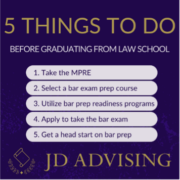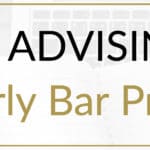What If I Don’t Know An MEE Answer?
What If I Don’t Know An MEE Answer?
In theory, the MEE should be a straightforward part of the bar exam: you read the fact pattern, assess the question, and use IRAC to discuss the relevant issues. As with most things on the bar exam, this is easier said than done. Sometimes the examiners focus a fact pattern and question on an obscure or challenging area of the law. Other times, a student encounters a fact pattern dealing with a topic that they didn’t spend much time on. Still other times, a student draws a complete blank for no apparent reason. If any of these situations befall you on the bar exam, don’t panic! In this post, we’ll discuss what you should do if you don’t know the answer to an MEE question.
What If I Don’t Know An MEE Answer?
1. Don’t avoid the call of the question.
If you’re unfamiliar with the area of law being tested or don’t recall the rule for a relevant issue, it might be tempting to dodge the question altogether and construct an answer addressing other issues that you’re more comfortable with. Don’t make this mistake—graders can tell when an examinee is avoiding the question. Also, chances are that most of this ancillary information will not earn you any points! Instead, construct your answer by attempting to respond to the question being asked, even if you’re shaky on a specific issue and/or a specific rule.
2. Do your best to identify the relevant issue(s) .
Most MEE questions explicitly or implicitly require you to discuss a legal issue raised by the fact pattern. If the issue is explicitly mentioned in the question, you can start from there. If the issue is not mentioned, review the fact pattern for any hints. Sometimes the fact pattern itself will essentially give you the issue, by, for example, discussing a party’s argument. When all else fails—and at the bare minimum—you should identify the broadest or most general principle at stake.
Let’s face it: sometimes it’s not even clear that an MEE question is testing an area of law covered by the bar exam. If you find yourself completely baffled by the question, just do your best to point out any issue that might be relevant to answering the question. For example, if an evidence fact pattern/question appears to arguably involve a tricky hearsay problem possibly dealing with the business records exception, start off by just identifying that hearsay is at issue.
3. Do your best to state the rule of law.
Once you’ve chosen the issue, it’s time to state the rule of law. If you don’t recall a specific rule, start with the most general rule and work from there. Do this confidently. You want the grader to get the impression that you know what you’re talking about!
Using our evidence/business records example, you should start by stating the most general rule for hearsay—i.e., define what hearsay is and state the rule against hearsay. Then, you should explain that there are exceptions to the general rule against hearsay and that one of the exceptions is the business records exception. If you don’t remember the precise test for the business records exception, try your best to piece it together.
4. Confidently apply the facts to your rule.
Use as many facts as you can in your analysis. This beefs up your answer as a whole and shows the grader that you at least know how to distinguish arguably relevant facts from completely irrelevant facts. Even if you’re not 100% sure that your rule statement is correct, apply the rule confidently to the facts.
Returning to our evidence/hearsay example, you should just apply whatever business records exception rule you came up with to whatever facts are relevant to the rule. It could turn out that 75% of your rule is wrong, but if you apply it confidently and directly, you’re showing the grader that you know how to perform legal analysis and produce an organized and coherent piece of legal writing.
5. State a conclusion that responds to the call of the question
As discussed above, be sure to respond to the call of the question. If you are less than excited about your discussion so far, but you think you have a legal “hunch” of what the conclusion should be, trust your hunch. If you haven’t developed this sense yet, just state the conclusion that flows naturally from your analysis. In either case, state your conclusion in a way that acknowledges that you could be wrong—i.e., use the word “likely” strategically.
Let’s say that in our evidence/hearsay example, you reach the conclusion that the document at issue would probably be admissible under the business records exception (or your version of it). You should write something like this: “Thus, the document would likely be admissible under the business records exception.”
If your conclusion is incorrect, so be it. By the way—this is a perfect example of why you should use IRAC instead of CRAC on the MEE; if your conclusion is incorrect, you don’t want it to be the first thing the grader reads.
The Big Picture
If you encounter an MEE question on the bar exam that you don’t know the answer to, don’t panic—it happens, and you’re in good company! If you respond to the call of the question, apply the IRAC method, and write confidently in each section of your discussion, you can turn a potential disaster into a salvageable opportunity to earn points.
Looking to Pass the Bar Exam?
Free Resources:
- 🌟Bar Exam Free Resource Center: Access our most popular free guides, webinars, and resources to set you on the path to success.
- Free Bar Exam Guides: Expert advice on the MBE, the MEE, passing strategies, and overcoming failure.
- Free Webinars: Get insight from top bar exam experts to ace your preparation.
Paid Resources:
- 🏆One-Sheets: Our most popular product! Master the Bar Exam with these five-star rated essentials.
- Bar Exam Outlines: Our comprehensive and condensed bar exam outlines present key information in an organized, easy-to-digest layout.
- Exclusive Mastery Classes: Dive deep into highly tested areas of the MBE, MEE, MPT, and CA bar exams in these live, one-time events.
- Specialized Private Tutoring: With years of experience under our belt, our experts provide personalized guidance to ensure you excel.
- Bar Exam Courses: On Demand and Premium options tailored to your needs.
- Bar Exam Crash Course + Mini Outlines: A great review of the topics you need to know!
🔥 NEW! Check out our Repeat Taker Bar Exam Course and our new premier Guarantee Pass Program!







Leave a Reply
Want to join the discussion?Feel free to contribute!